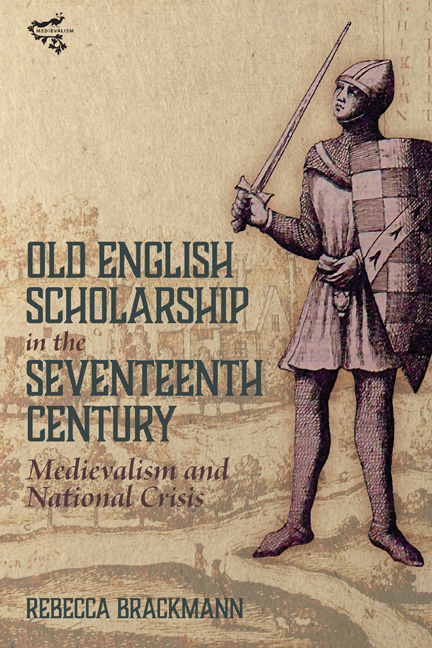Book contents
- Frontmatter
- Dedication
- Contents
- List of Illustrations
- Acknowledgments
- List of Abbreviations
- Note on Quotations
- Introduction: Medieval Studies in a Time of Crisis
- 1 Medievalism, the Self, and the World: Simonds D’Ewes and His Books
- 2 Abraham Wheelock’s Godly Historian: The 1643/1644 Bede
- 3 The Law’s Deep Roots: Roger Twysden’s Edition of William Lambarde’s Archaionomia and Leges Henrici Primi
- 4 Monuments and Memory: William Somner’s Antiquities of Canterbury and Poems on the Regicide
- 5 “The Saxons Live Againe”: William Somner’s Dictionarium Saxonico- Latino-Anglicum
- 6 The Echoing Past: William Dugdale and Early Medieval Warwickshire
- Epilogue: Texts in Conversation: John Milton’s Paradise Regained and the Old English Christ and Satan
- Bibliography
- Index
- Miscellaneous Endmatter
3 - The Law’s Deep Roots: Roger Twysden’s Edition of William Lambarde’s Archaionomia and Leges Henrici Primi
Published online by Cambridge University Press: 28 December 2023
- Frontmatter
- Dedication
- Contents
- List of Illustrations
- Acknowledgments
- List of Abbreviations
- Note on Quotations
- Introduction: Medieval Studies in a Time of Crisis
- 1 Medievalism, the Self, and the World: Simonds D’Ewes and His Books
- 2 Abraham Wheelock’s Godly Historian: The 1643/1644 Bede
- 3 The Law’s Deep Roots: Roger Twysden’s Edition of William Lambarde’s Archaionomia and Leges Henrici Primi
- 4 Monuments and Memory: William Somner’s Antiquities of Canterbury and Poems on the Regicide
- 5 “The Saxons Live Againe”: William Somner’s Dictionarium Saxonico- Latino-Anglicum
- 6 The Echoing Past: William Dugdale and Early Medieval Warwickshire
- Epilogue: Texts in Conversation: John Milton’s Paradise Regained and the Old English Christ and Satan
- Bibliography
- Index
- Miscellaneous Endmatter
Summary
SIR ROGER TWYSDEN cared deeply about his trees. In a manuscript notebook of advice to his sons, now London, British Library Additional MS 34164, he writes, “My sonns have a great care of your woods for as there is not a more honorable thing then wood and Tymber in an Estate and especyally about your howse or seat, so is it of great profit if well preserved.” He goes on in this vein for most of the page, explaining how many trees to take and save each year to promote growth and maintain the forest. In case his sons are unimpressed with the importance of this resource, he goes on to elucidate which wood is best for various uses. His concern for his woodlands runs through his journals and correspondence, and the circumstances of his life certainly gave him cause. As a constitutional royalist, Twysden was opposed to Charles I's extra-legal taxes and distressed by the Personal Rule. However, when the Long Parliament took a similarly high-handed approach to taxation and to law enforcement, he opposed it as well. Parties mattered less to him than constitutional principles. Twysden was incarcerated in London and then Lambeth by order of Parliament for much of the 1640s. During this time, his estate at Roydon Hall in Kent was sequestered and managed by the Kent County Committee, whose chair was a bitter enemy of Twysden's family. Under this management, Roydon Hall's forests were badly over-timbered, and Twysden could do nothing to stop it.
Twysden's letters during this time reveal his deep anguish over the felling of his woods, a feature that Twysden's biographer Frank Jessup feels needs some explanation:
[Timber] was more than a utilitarian product, it was also, in modern terminology, a status symbol. It was even more than that, it was a symbol of continuity, of a man's link with the past and with the future; with his ancestors from whom he had inherited his woods, with his descendants to whom he must leave them, improved, if possible, as a monument to his own care and wisdom.
- Type
- Chapter
- Information
- Old English Scholarship in the Seventeenth CenturyMedievalism and National Crisis, pp. 69 - 101Publisher: Boydell & BrewerPrint publication year: 2023



